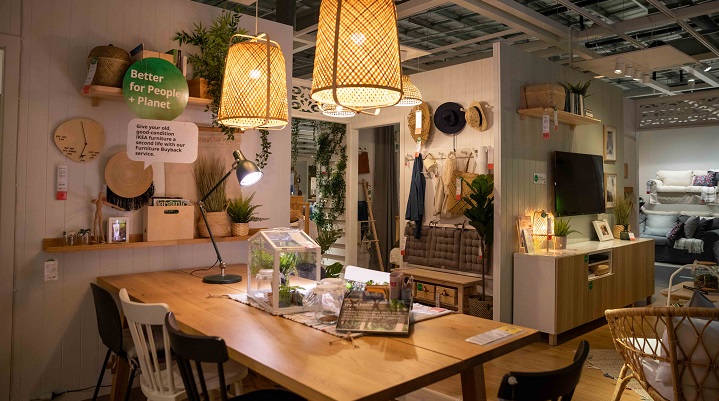Plant-based food, solar energy systems for the home and secondhand furniture are set to be the Billy bookcases of the future, as Ikea transforms its product range and the way it operates to become climate positive and circular by 2030. Over the past 12 months, the Swedish furniture giant has introduced over 30 global initiatives to reduce its carbon footprint and help customers lead more eco-friendly lives, including a plant ball substitute of its classic meatball and furniture buy-back sc
scheme.
And they are just the start of a decade of action, according to Ikea Australia’s country retail manager and chief sustainability officer Jan Gardberg.
“[T]here’s still so much more we can and will do, and with a decade left to protect our homes from the worst effects of climate change, we need action. At scale. Right now,” he wrote in the FY21 Leap Year of Sustainability Report published last week.
That’s not just Gardberg’s opinion. According to a survey conducted last month by YouGov, 85 per cent of Australians are worried about climate change. While 84 per cent remain hopeful it’s not too late to make a change, 66 per cent say we need to act immediately to make an impact.
Running on clean energy
In Australia, Ikea’s primary focus is on reducing carbon emissions from store operations. This involves transitioning stores to 100 per cent renewable energy and using only electric vehicles for all operations and services by 2025.
Last October, the retailer installed 1.2MW of solar panels on the roof of its Adelaide store along with a 3.4MWh battery as part of its Clean Energy Transformation Project with the South Australian Government, and it’s looking to launch similar projects in other locations.
“We’re currently in the process of exploring different options to meet our goal of operating on 100 per cent renewable electricity in all buildings by 2025, and for the entire value chain to be operating on 100 per cent renewable energy by 2030, become climate positive, and produce more energy than we use,” Mellisa Hamilton, IKEA Australia’s sustainability manager, told Inside Retail.
“This includes exploring similar approaches to the Clean Energy Transformation Project implemented in IKEA Adelaide, as well as how we can maximise and expand PV solar systems on our sites. We’re excited for the journey ahead.”
Ikea is looking to expand its SOLSTRÅLE range to all 30 Ingka markets by 2025. The affordable home solar system launched in Australia one year ago. It will also continue to grow its furniture buy-back program, which saw more than 18,000 products returned to Australian stores alone during a 10-day-long campaign in 2020.
“The lesson has been the overwhelming demand for the service, which has us focused on refining and expanding the service to be an ongoing and permanent part of the business,” Hamilton said.
“Moving forward, we’re looking at ways to refine the service to be able to meet [demand] and continue to increase consumer awareness to promote and enable circularity both within our business and our customer’s life at home.”
‘Can’t do it alone’
One of the biggest obstacles Ikea must overcome to reach its ambitious 2030 target of becoming climate positive is getting consumers, governments and other businesses to participate in its plan.
“The progress we’ve made to date on these initiatives has been within the business, so within our control – that is we’ve identified the steps we’ve needed to take and taken action,” Hamilton said.
“As we look ahead, we know we have a big responsibility and opportunity to continue tackling the climate crisis. But it’s a shared responsibility and we can’t do it alone,” she said.
“We’re constantly exploring how we can partner with other like-minded businesses and government initiatives to further progress the work we are doing.”
According to YouGov’s research, 51 per cent of Australians believe the government holds the most responsibility for tackling climate change, compared to 19 per cent who say consumers are most responsible, followed by business at nine per cent.
But the lack of a consistent approach across the country is an issue, according to Hamilton.
“As a national business, we often find ourselves working on one problem in multiple markets with different regulations. We feel there is a real need for more harmonised policy and regulation at a national level to enable and encourage businesses and consumers to live more sustainably,” she said.
One area where Ikea has started to see this consistency is around waste.
“We are optimistic about the future of Australia and stand ready to work hand in hand with all levels of government to create a prosperous and sustainable society,” Hamilton said.

